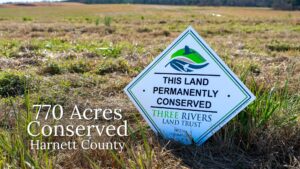
Gold Panning Policy
Since the founding of Three Rivers Land Trust in 1995, we have endeavored to permanently protect thousands of acres in Central NC, including natural areas rivers and streams, wildlife habitats, farmland, and historic sites.
To this end, it is the policy of the Three Rivers Land Trust Board of Directors to only allow very low impact hand panning for gold in the Uwharrie River only.
We do not allow metal detecting on our properties. We do not allow any gold prospecting outside of the main body of the Uwharrie River. EXCEPT FOR GOLD PANS AND HAND TOOLS, SUCH AS PICKS AND SHOVELS, IT IS PROHIBITED TO USE ANY MOTORIZED OR MECHANICAL EQUIPMENT OR MINING AIDS USED FOR MINERAL EXTRACTION. **MECHANICAL DREDGING IS PROHIBITED. **MOTORIZED EQUIPMENT INCLUDES: ANY EQUIPMENT HAVING OR USING AN ENGINE OR MOTOR.
**MECHANICAL EQUIPMENT AND MININNG AIDS INCLUDE: SLUICE BOXES, DRY WASHERS, GOLD SCREWS, GOLD BUGS, ROCKER BOXES, WHEEL BARROWS OR OTHER DEVICES, DESIGNED TO INCREASE PRODUCTION ABOVE THAT LEVEL OBTAINED WITH GOLD PANS AND HAND TOOLS.
There are some unique and endangered aquatics present in the streams on many of our properties, particularly along the Uwharrie River, and so we cannot allow anything other than panning by hand with a shovel. Additionally, many of our properties were purchased through grant funding provided for preserving and improving water quality, so we would be in violation of our agreements if we allowed activities which we believe to be detrimental to water quality.
Recreation is certainly one of our focuses and The LandTrust recognizes that gold panning is an important part of the history of our region and a popular recreational avenue. However, mechanical dredging or crushing of rocks or anything moving a lot of dirt poses a threat to the natural values of the area and is not permissible.
No excavations or soil disturbances to the banks of the river.
Do not cut trees, limbs or brush, do not dig up ground cover.
Pack out everything you brought into the area, especially trash.
The NC Division of Water Quality may have some additional restrictions, so you may want to consider contacting and consulting with them as well.